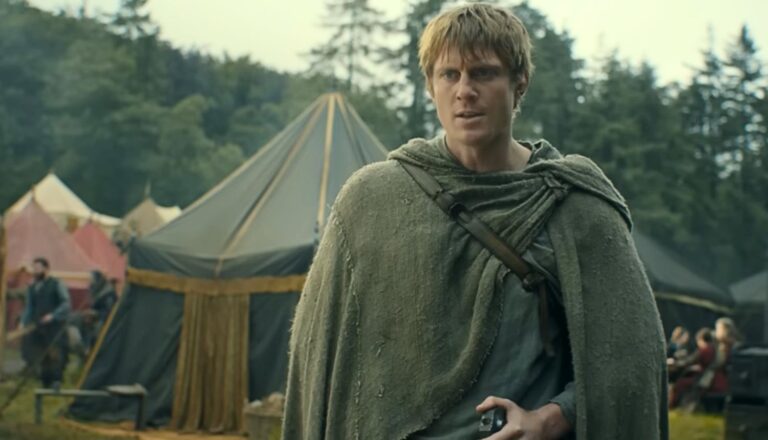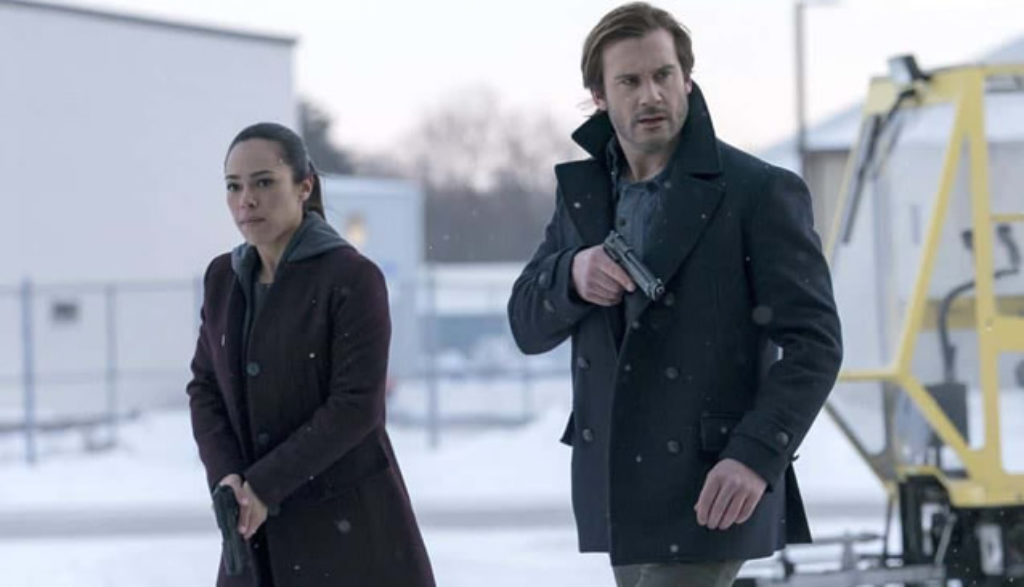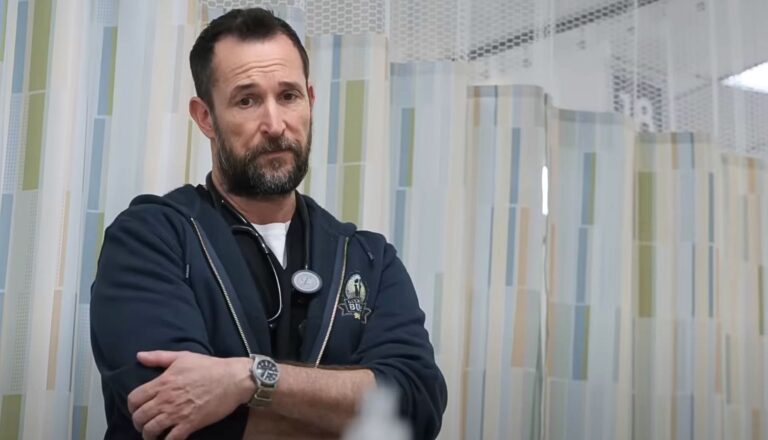
A Knight of the Seven Kingdoms
George R.R. Martin’s ‘A Knight of the Seven Kingdoms’ is more noble than his other works, but it’s quite graphic all the same.

Bryan Mills wasn’t always an old vengeful killer with a particular set of skills. No, he was once a young vengeful killer … still honing those skills.
We meet that killer in NBC’s TV take on Taken, a prequel to Liam Neeson’s semi-beloved, seriously bloody big-screen franchise of the same name. But instead of saving immediate family members from truly terrible bad ‘uns, Bryan’s grieving for the family member that was taken from him: his poor, dead sister, killed by notorious cartel boss Carlos Meija.
Conveniently, the former Green Beret is part of a super-secret special intelligence agency. (So many secret agencies on television … no wonder our national deficit is out of control.) So as he tries to prove his worth to his steely boss, Christina, as well as his new teammates, Bryan also manages to get revenge on Meija (in the Season 1 finale) for the dastardly deed he’s done. But Bryan still has work to do: He vents his seriously scowling intensity on other criminal lowlifes or career terrorists that unwisely wander into his crosshairs.
It’s safe to say that Taken hasn’t exactly taken the television world by storm. It suffers from so-so ratings and scathing reviews, both of which seem well-deserved.
Given its cinematic forebears, it’s to be expected that this NBC fill-in show would be preoccupied with bloody, terminal justice (if we characterize this sort of vengeance as justice at all, that is). And while this broadcast series doesn’t boast premium-cable levels of gore, it certainly doesn’t skimp on its fake hemoglobin budget. People die with disturbing frequency here—often via bullets and sometimes with copious amounts of blood exiting their aspirating arteries. Equally troubling are the bad guys who don’t die, but who are instead captured and threatened with torture and death. Seems like Taken’s creators feel that 24′s Jack Bauer was just an old softie.
Taken isn’t above showing men and women in various stages of undress, either. And while explicit sexual activity hasn’t been a big problem in the early going, the show’s format suggests that the camera may tiptoe into the boudoir when it’s not busy filming the latest kill mission. Language can be an issue, too.
Ironically, for a show so preoccupied with black vengeance and crimson death, Taken is quite silly. When Bryan, watching a television monitor, spots a dark grenade in the middle of a bare, white floor, the achievement is treated as if he cracked Cretan hieroglyphics. And despite the special ops team’s reliance on slavish obedience, teamwork and unquestioned trust, no one seems to much mind when Bryan opts to leaves his post to run down a street or scale a building or, I don’t know, pick up a latte.
Admittedly, the movies required a certain suspension of disbelief, too. But unable to lean on Neeson’s steely, baritone gravitas, NBC’s Taken must instead rely on lead actor Clive Standen’s clenched jaw and scruffy chin to give the show its moxie and menace. And, at least in the early going, the scruff doesn’t seem quite up to the job. When a captured bad guy asks what dark-site boat he’s on, Bryan crouches, glares and hisses, “ship”—apparently correcting the villain in his nautical terminology. Indeed, one feels like Taken might’ve served NBC better as a Naked Gun-style comedy.
But it’s not, which leaves us with just four final words of advice: Don’t be taken in.
(Editor’s Note: Plugged In is rarely able to watch every episode of a given series for review. As such, there’s always a chance that you might see a problem that we didn’t. If you notice content that you feel should be included in our review, send us an email at letters@pluggedin.com, or contact us via Facebook or Instagram, and be sure to let us know the episode number, title and season so that we can check it out.)
When the son of a CIA agent is kidnapped in the middle of the night, Bryan and his team of secret government lackeys stumble upon an illegal organ donation racket: People are taken and killed for their hearts and lungs. While the agent’s son is rescued, a 17-year-old girl is still in danger, forcing Bryan into a wild scramble to save her.
Bryan, as is his way, beats up a whole bunch of people, punching them, kicking them, flipping them and occasionally throwing them up against walls. (He also chokes someone with a stethoscope.) Most of them faint dead away from the barrage. An unexpected helper bites the hand of the one who would hold her against her will, and uses a set of surgical shock paddles to knock another assailant unconscious. But Bryan also suffers for his craft, being knocked unconscious (with a drug) at one point while he’s also being Tazed. He’s also nearly taken out by a surgical drill.
Bad guys get their hands stepped on, arms cracked, noses punched and groins kneed. Victims are overcome with drugs placed on handkerchiefs before they are taken, and most are being prepped to be killed for their organs. A guy wrecks his motorcycle on purpose, sprawling out on the asphalt.
A victim gives her ring to another victim, telling him to rub it as a good luck charm. Bryan says that there’s a “special place in hell” for organ traffickers. Bryan’s partner Santana threatens a would-be informant with his watch, telling him that unless he cooperates, he’ll have to hide the expensive piece “someplace really uncomfortable” when he goes to prison. A frantic father tries to save his critically ill boy, who’s in desperate need of a lung transplant. We hear people say “b–ch” and misuse God’s name.
Bryan, grieving the death of his sister, gets confused during a training operation and nearly beats a fellow special ops helpmate to death. Boss Christina decides to give him desk duty until he proves that he won’t kill his teammates. But circumstances force him into the field, and he validates her reluctant trust by killing and maiming only bad guys.
A woman gets shot in the throat, and blood pours out of the wound. She eventually dies. Another woman in the car with her also is apparently hit; she’s rushed to the hospital, her face covered in her friend’s blood (and her shirt soaked with her own). Bryan stabs someone in the chest with part of a mop handle while shooting someone else in a shoulder.
Two doctors get shot in the forehead (we see the clean bullet holes). Several other people die from lethal bullet wounds, too. Someone’s knocked off a motorcycle. Bryan gets into a fistfight with a would-be assassin, eventually pushing him off a ledge and onto a car below. (The man survives, but barely; the car is a total loss.) Bryan also repeatedly punches a good guy in the face, the man’s mouth filling with blood. Someone else dies from a heart attack caused by a secret drug. We see someone receiving an injection.
Two women are shown in a bath together, obviously naked. (We see a bit of the side of their breasts.) Bryan answers the door wearing only a towel. We hear a reference to women and children refugees being sold into sexual slavery. Someone steals a phone. Characters drink beer. We hear “a–” four times, as well as “b–ch” and “h—.” God’s name is misused twice.

Paul Asay has been part of the Plugged In staff since 2007, watching and reviewing roughly 15 quintillion movies and television shows. He’s written for a number of other publications, too, including Time, The Washington Post and Christianity Today. The author of several books, Paul loves to find spirituality in unexpected places, including popular entertainment, and he loves all things superhero. His vices include James Bond films, Mountain Dew and terrible B-grade movies. He’s married, has two children and a neurotic dog, runs marathons on occasion and hopes to someday own his own tuxedo. Feel free to follow him on Twitter @AsayPaul.

George R.R. Martin’s ‘A Knight of the Seven Kingdoms’ is more noble than his other works, but it’s quite graphic all the same.

Does it take a thief to catch a thief? Does it take lots of bad content to make a good TV show?

The Hunting Party is far from the most gruesome drama on television, but its disturbingly inventive ways of killing may make viewers a bit queasy.

Max’s hospital drama ‘The Pitt’ strives to be medically accurate. While a noble goal, this show comes with a whole lot of content, too.